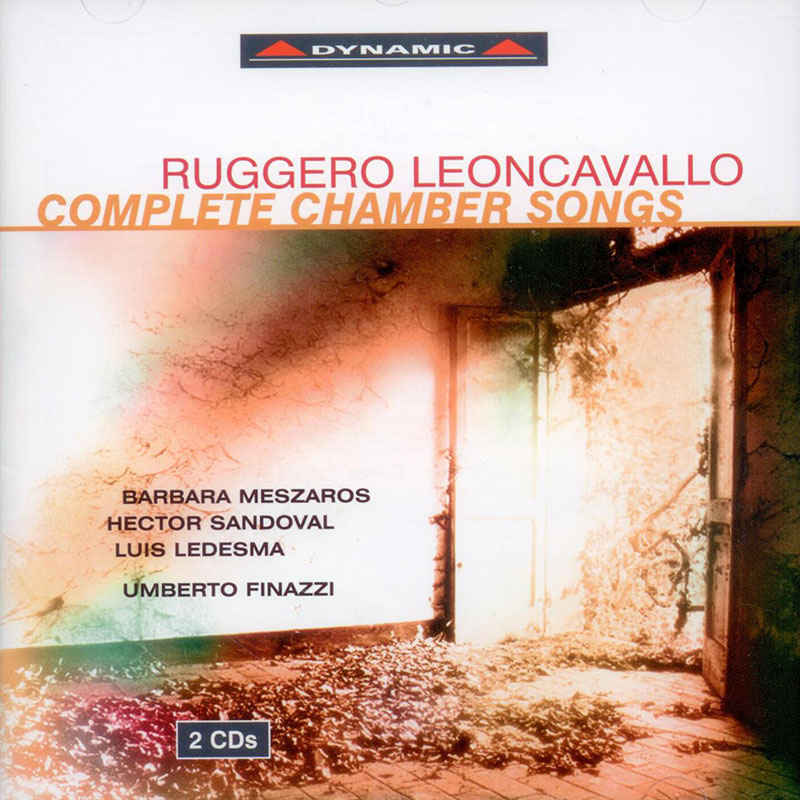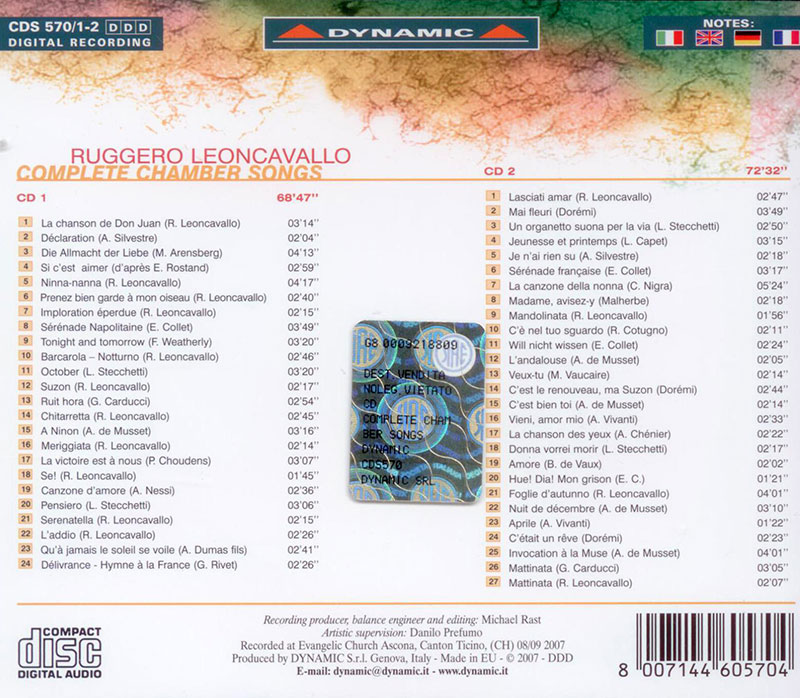Logowanie
Dziś nikt już tak genialnie nie jazzuje!
Bobby Hutcherson, Joe Sample
San Francisco
SHM-CD/SACD - NOWY FORMAT - DŻWIĘK TAK CZYSTY, JAK Z CZASU WIELKIEGO WYBUCHU!
Wayne Shorter, Freddie Hubbard, Herbie Hancock, Ron Carter, Elvin Jones
Speak no evil
UHQCD - dotknij Oryginału - MQA (Master Quality Authenticated)
Chesky! Niezmiennie perfekcyjny
Winylowy niezbędnik
ClearAudio
Double Matrix Professional - Sonic
najbardziej inteligentna i skuteczna pralka do płyt winylowych wszelkiego typu - całkowicie automatyczna
LEONCAVALLO, Barbara Meszaros, Hector Sandoval, Louis Ledesma
Complete Chamber Songs

- CD 1
- 1 La chanson de Don Juan (R. Leoncavallo) (B) 03’14’’
- 2 Déclaration (A. Silvestre) (T) 02’04’’
- 3 Die Allmacht der Liebe (M. Arensberg) (S) 04’13’’
- 4 Si c’est aimer (d’après E. Rostand) (S) 02’59’’
- 5 Ninna-nanna (R. Leoncavallo) (S) 04’17’’
- 6 Prenez bien garde à mon oiseau (R. Leoncavallo) (S) 02’40’’
- 7 Imploration éperdue (R. Leoncavallo) (T) 02’15’’
- 8 Sérénade Napolitaine (E. Collet) (T) 03’49’’
- 9 Tonight and tomorrow (F. Weatherly) (S) 03’20’’
- 10 Barcarola - Notturno (R. Leoncavallo) (S) 02’46’’
- 11 October (L. Stecchetti) (B) 03’20’’
- 12 Suzon (R. Leoncavallo) (B) 02’17’’
- 13 Ruit hora (G. Carducci) (B) 02’54’’
- 14 Chitarretta (R. Leoncavallo) (B) 02’45’’
- 15 A Ninon (A. de Musset) (T) 03’16’’
- 16 Meriggiata (R. Leoncavallo) (T) 02’14’’
- 17 La victoire est à nous (P. Choudens) (T) 03’07’’
- 18 Se! (R. Leoncavallo) (S) 01’45’’
- 19 Canzone d’amore (A. Nessi) (S) 02’36’’
- 20 Pensiero (L. Stecchetti) (S) 03’06’’
- 21 Serenatella (R. Leoncavallo) (S) 02’15’’
- 22 L’addio (R. Leoncavallo) (B) 02’26’’
- 23 Qu’à jamais le soleil se voile (A. Dumas fils) (B) 02’41’’
- 24 Délivrance - Hymne à la France (G. Rivet) (Trio) 02’26’’
- CD 2
- 1 Lasciati amar (R. Leoncavallo) (T) 02’47’’
- 2 Mai fleuri (Dorémi) (S) 03’49’’
- 3 Un organetto suona per la via (L. Stecchetti) (S) 02’50’’
- 4 Jeunesse et printemps (L. Capet) (S) 03’15’’
- 5 Je n’ai rien su (A. Silvestre) (B) 02’18’’
- 6 Sérénade française (E. Collet) (B) 03’17’’
- 7 La canzone della nonna (C. Nigra) (B) 05’24’’
- 8 Madame, avisez-y (Malherbe) (B) 02’18’’
- 9 Mandolinata (R. Leoncavallo) (T) 01’56’’
- 10 C’è nel tuo sguardo (R. Cotugno) (S) 02’11’’
- 11 Will nicht wissen (E. Collet) (S) 02’24’’
- 12 L’andalouse (A. de Musset) (T) 02’05’’
- 13 Veux-tu (M. Vaucaire) (S) 02’14’’
- 14 C’est le renouveau, ma Suzon (Dorémi) (S) 02’44’’
- 15 C’est bien toi (A. de Musset) (S) 02’14’’
- 16 Vieni, amor mio (A. Vivanti) (S) 02’33’’
- 17 La chanson des yeux (A. Chénier) (B) 02’22’’
- 18 Donna vorrei morir (L. Stecchetti) (B) 02’17’’
- 19 Amore (B. de Vaux) (B) 02’02’’
- 20 Hue! Dia! Mon grison (E. C.) (T) 01’21’’
- 21 Foglie d’autunno (R. Leoncavallo) (S) 04’01’’
- 22 Nuit de décembre (A. de Musset) (S) 03’10’’
- 23 Aprile (A. Vivanti) (S) 01’22’’
- 24 C’était un rêve (Dorémi) (B) 02’23’’
- 25 Invocation à la Muse (A. de Musset) (B) 04’01’’
- 26 Mattinata (G. Carducci) (B) 03’05’’
- 27 Mattinata (R. Leoncavallo) (T) 02’07’’
- Barbara Meszaros - soprano
- Hector Sandoval - tenor
- Louis Ledesma - baritone
- LEONCAVALLO
In the second half of the nineteenth century, and particularly after the unification of Italy, the drawing-room romance enjoyed a real publishing boom in Italy, coinciding with the strong economic expansion of the young Italian nation, and with the timid rise of a relatively well-to-do middle class which counted the possession of a piano among its status symbols. The same period also saw the birth of a wholly new professional figure, the composer specialised in drawing-room romances. In some instances this was an operatic composer who had retired from the theatre, but often it was a musician who chose not to tackle opera at all. The production of Ruggero Leoncavallo, who was a prolific composer of this type of work, also fits into this ambit. Many of Leoncavallo’s romances began to be known after 1892, when, in the wake of the success of I Pagliacci, publishers all over Europe began to be interested in publishing his brief pages for voice and piano, which certainly guaranteed good commercial sales. Yet some of these romances had already been published at the start of his Leoncavallo’s career, when he tried to introduce himself to publishers with pleasant little pieces that made modest demands on the publishers. There are also a number of drawing-room romances that belong to the period when Leoncavallo was staying in France, the years from 1882 to 1888. The lyrics in French are very numerous; indeed they make up about half of the pieces recorded on our CD. Then a third set of romances was written after Leoncavallo returned to Italy, after 1888 that is. In purely musical terms there is practically no trace of the Verismo movement in all these compositions; what there is rather is a marked tendency towards more intimate, twilight attitudes - as well indeed as felicitously carefree ones - almost to confirm the fact that Leoncavallo saw the truculent Verismo of I Pagliacci more as a concession to the vogue of the day rather than as a convinced identification with its poetics and style of composition.


































